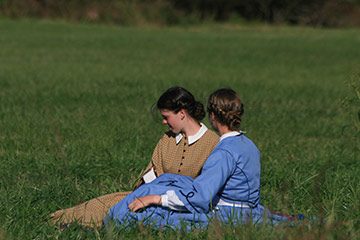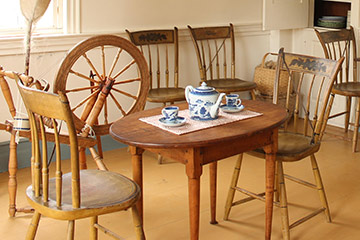
02/09/2016
Those immersed in social media who find it can become less than friendly might learn from 19th century techniques that used memorization to keep conversations more upbeat.
Kevin Sheets, a SUNY Cortland associate professor of history, will explore early American methods of enhancing memory for the sake of a more refined social discourse on Wednesday, Feb. 17, at the College.
 |
|
| Kevin Sheets |
Sheets, who has a Ph.D. in American history from the University of Virginia, will present “The Art of Memory and Culture of Thought in 19th Century America” at 4:30 p.m. in Moffett Center, Room 2125.
A reception will precede his talk at 4 p.m. in the Rozanne M. Brooks Museum, Moffett Center, Room 2126.
This presentation is free and open to the public. The lecture continues this year’s 2015-16 Rozanne M. Brooks Lectures theme “The Culture of Thought.” The series allows audience members to explore what has shaped, and is changing, the way humans think about the world around them.
Sheets will look at early mnemonic systems in the late 1830s through early 1840s and the roles that they played in the 19th century, specifically in the education system. He will illustrate these early memory systems and encourage the audience to engage in brief exercises.
“These memory systems were popular because they were compatible with a cultural imperative geared towards facilitating refined conversation,” Sheets said. “Memorization was seen as a useful tool in helping people to navigate a polite social world.”
Sheets also will touch on the shift from students pursuing a college education in the early 19th century for the purpose of consuming knowledge to today’s young scholars using their classroom time learning how to produce knowledge.
According to Sheets, at the turn of the 20th century, memorization of common knowledge became a less important role in the college system and in society.
The lecture will give the audience a sense of what 19th century memorizations were like and why the systems were popular. Sheets hopes the audience will take away an appreciation for the culture of this time period and a better understanding of transformations in the American university system.
 |
|
| Conversation was the center of social life in 19th century American society. Shown are a typical tea service and above left, two women talking with one another. |
Sheets serves as graduate coordinator for the College’s History Department. He has coordinated several projects funded by a U.S. Department of Education Teaching American History (TAH) grant. He and colleague Randi Storch, professor and History Department chair, have obtained several rounds of National Endowment for the Humanities (NEH) funding to co-present “Forever Wild: The Adirondacks in the Gilded Age and Progressive Era,” a summer program which brings educators from all over the country to experience first-hand a unique piece of history at the College’s William H. Parks Family Center for Environmental and Outdoor Education at Raquette Lake.
The 2015-16 Brooks Lecture Series is sponsored by a grant from Auxiliary Services Corporation and the Cortland College Foundation.
For more information, contact Sharon R. Steadman, a professor of sociology/anthropology, Brooks lecture series organizer and Brooks Museum director, at 607-753-2308.
Prepared by public relations writing intern Bethany Lunden